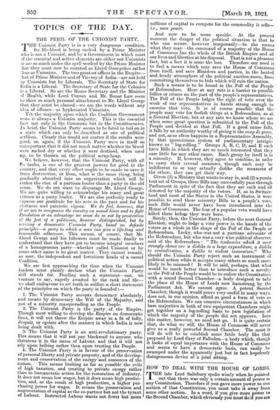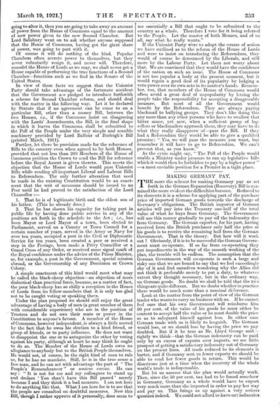HOW TO DEAL WITH THE HOUSE OF LORDS.
THE late Lord Salisbury spoke wisely when he pointed out that there was only a certain amount of power in any Constitution. Therefore if you gave more power to one section of that Constitution, you must take it away from some other section. In a word, if you give more power to the Second Chamber, which obviously you must do if you are going to alter it, then you are going to take away an amount of power from the House of Commons equal to the amount of new power given to the new Second Chamber. But Lord Salisbury went on to ask whether anyone supposed that the House of Commons, having got the giant share of power, was going to part with it., Of course it will do nothing of the kind. Popular Chambers often accrete power to themselves, but they never voluntarily resign it, and never will. Therefore, remodel the House of Lords as we may, we shall never get a House capable of performing the true functions of a Second Chamber—functions such as we find in the Senate of the United States.
In view of these facts we suggest that the Unionist Party should take advantage of the fortunate accident that the Government are pledged to introduce forthwith a scheme for Second Chamber reform, and should deal with the matter in the following way. Let it be declared by Statute that if no agreement can be come to on a particular Bill, other than a money Bill, between the two Houses, i.e., if the Commons insist on disagreeing with the Lords' Amendments, the Bill, in the final shape in which it leaves the Commons, shall be submitted to the Poll of the People under the very simple and sensible machinery provided by Lord Balfour of Burleigh's Bill (printed March, 1911). Further, let there be provision made for the reference of Bills to the country even when agreed to by both Houses, provided that not less than 200 Members of the House of Commons petition the Crown to send the Bill for reference before the Royal Assent is given thereto. This meets the objection that the House of Lords would pass Unionist Bills while sending all-important Liberal and Labour Bills to Referendum. The only further alteration that need be made in the existing Constitution would be an enact- ment that the writ of summons should be issued to no Peer until he had proved to the satisfaction of the Lord Chancellor :- 1. That he is of legitimate birth and the eldest son of his father. (This he already does.) 2. That he has shown his capacity for taking part in public life by having done public service in any of the positions set forth in the schedule to the Act ; i.e., has been Mayor or Lord Mayor of a town, been elected to Parliament, served on a County or Town Council for a certain number of years, served in the Army or Navy for over ten years, occupied a post in the Civil or Diplomatic Service for ten years, been created a peer or received a step in the Peerage, been made a Privy Councillor or a Grand Cross of any Order, or received some signal mark of the Royal confidence under the advice of the Prime Minister, as, for example, a post in the Government, special mission abroad, or the Governorship of any Dominion or Crown Colony.
A simple enactment of this kind would meet what may be called the black-sheep objection—an objection of more dialectical than practical force, because, as a matter of fact, the poor black-sheep has so chilly a reception in the House of Lords from its fellow-members that it is only too glad not to be caught voting or speaking there. Under the plan proposed we should still enjoy the great advantage of having a body of men (a great number of them with- considerable experience) who are in the position of Trustees and do not owe their seats or power in the Constitution to anyone's favour. A member of the House of Commons, however independent, is always a little moved by the fact that he owes his election to a kind friend, or group of friends, or to party influence. He does not want to disappoint the one or to antagonize the other by voting against his party, although at heart he may think he ought to do so. The Member of the House of Lords owes no allegiance to anybody but to the British People themselves. He would not, of course, be the right kind of man to rule us, for he has no mandate. Still, he is in the true sense a free man, and he can act with advantage the part of " The People's Remembrancer " or amicus curiae. He can say : " It is not for me and my colleagues to stand up and declare ' You shan't have this Bill passed ' merely because .I and they think it a bad measure. I am not here to do anything like that. What I am here for is to see that the people are consulted on doubtful measures. Now. this Bill, though I rather approve of it personally, does se,ein to me essentially a Bill that ought to be submitted to the country as a whole. Therefore I vote for it being referred to the People. Let the master of both Houses, and of us all, say what he really wants."
If the Unionist Party were to adopt the course of action we have outlined as to the reform of the House of Lords and were to insist on introducing the Referendum, they would of course be denounced by the Liberals, and still more by the Labour Party. Let them not worry about that. We are convinced that they would have the confidence of the nation on such an issue. The House of Commons is not too popular a body at the present moment, but it would regain a good deal of its popularity by lodging a veto power over its own acts in its master's hands. Remem- ber, too, that members of the House of Commons would often avoid a great deal of unpopularity by letting the people take the responsibility for accepting a disagreeable measure. But most of all the Government would benefit by the Referendum. They are always paying blackmail to bullying groups. They don't like doing this any more than any other persons who have to swallow that bitter sauce, yet now, when a sufficient group of log- rollers or blackmailers approach them, they may have to do what they really disapprove of—pass the Bill. If they had a Referendum they would be able to give a qualified promise : " Yes, we will pass the measure you want, but remember it will have to go to Referendum. We can't prevent that, as you know."
As the cynic might say, " The Poll of the People would enable a Ministry under pressure to run up legislative bills which it would then be forbidden to pay by a higher power " —a most enviable position for a Premier m a tight place.



































 Previous page
Previous page